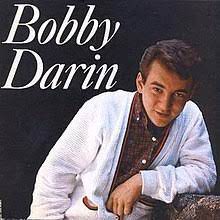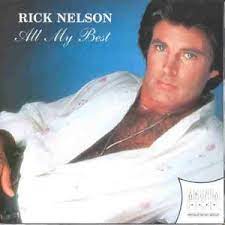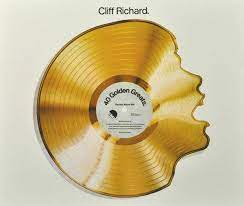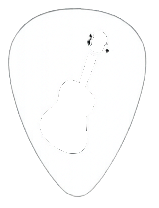- Home
- Easy Elvis Guitar Songs
- Elvis Songs in the 50s
Learn Elvis Presley Guitar Songs from the 1950s
The 1950s gave birth to rock and roll — and no one embodied that movement quite like Elvis Presley.
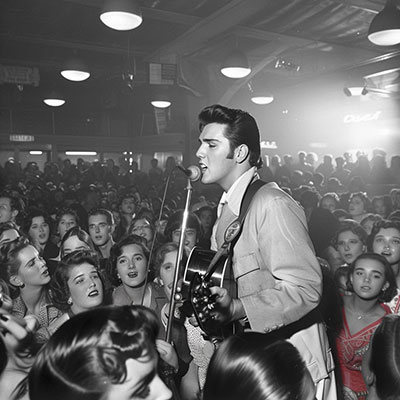
His unmistakable voice, charismatic stage presence, and electrifying energy forever changed the sound of popular music.
In this special collection of 1950s Elvis Presley guitar tutorials, you’ll learn how to play 9 of his most iconic hits, from the rebellious edge of “Blue Suede Shoes” to the smooth balladry of “A Fool Such As I.”
Whether you're a new player or a longtime fan, these lessons will help you bring the King’s signature sound to life on your acoustic guitar.
🎸 Overview Video - “Watch This Preview of My Easy Elvis Guitar Songs”
Soon.
Easy Elvis Guitar Songs
Elvis Guitar Songs From The 70s
Elvis Guitar Songs From The Movies
Elvis Presley Love Songs
===================================================================================================================================
10 Elvis Presley Coloring Pages
12 Elvis Presley Wall Art
Elvis Presley Guitar Songs List
A Fool Such As I
All Shook Up
Anyway You Want Me
Blue Moon Of Kentucky
Blue Suede Shoes
Devil In Disguise
Don't Be Cruel
Good Rockin Tonight
Heartbreak Hotel
I Dont Care If The Sun Don't Shine
I Forgot To Remember To Forget
I Want You I Need You I Love You
I'm Left You're Right She's Gone
Lawdy Lawdy Lawdy Miss Clawdy
Memphis Tennessee
>Money Honey
Mystery Train
One Night With You
Paralyzed
So Glad You're Mine
Such A Night
Teddy Bear
That's Alright Mama
Treat Me Nice
Trying To Get To You
When My Blue Moon Turns To Gold Again
You're A Heartbreaker
A Big Hunk Of Love - Learn To Play On Guitar
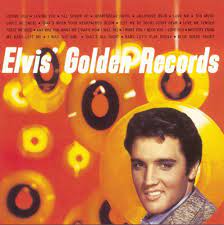
A Big Hunk o' Love and it was released as a single on June 23, 1959and became one of his popular hits. The song was written by Aaron Schroeder and Sid Wyche.
The
single reached No. 1 on the Billboard Hot 100 chart, becoming one of
Elvis' chart-topping hits. "A Big Hunk o' Love" is an uptempo rock and
roll song with a driving rhythm. It showcases Elvis' energetic and
powerful vocal delivery.
The B-side of the single was "My Wish Came True," another song that was recorded during the same session.
"A Big Hunk o' Love" was often included in Elvis' live performances, allowing him to showcase his dynamic stage presence.
Chords And Strumming
I play this in A, D, D7, E and E7 but Elvis is up in C. A steady down up down up rhythm pattern with some chops is needed here and some lead work in standard tuning.
Guitar Lesson Details - (chords & lyrics sheet incl with lesson)
Chords & LyricsBack To Song List
A Fool Such As I - Learn To Play On Guitar
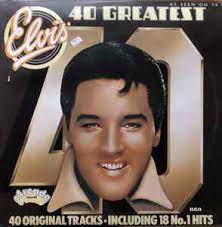
A Fool Such as I was originally written by Bill Trader and recorded by Elvis during his early career. The track was recorded on June 10, 1958, during a recording session in Nashville, Tennessee and was later released as a single on March 10, 1959. The single became a commercial success, reaching No. 2 on the Billboard Hot 100 chart.
The B-side of the single was "I Need Your Love Tonight," another song that was recorded during the same session.
"A Fool Such as I" is a mid-tempo ballad that showcases Elvis' emotive vocal style. The song features a blend of rock and roll and country elements.
While the song was initially released as a single, it was later included on compilation albums and reissues of Elvis' music. It can be found on various Elvis Presley collections.
"A Fool Such as I" remains one of Elvis' well-known songs from the late 1950s and is often associated with his signature sound during that era.
Chords And Strumming
This one is played in standard tuning with a steady down up down up rhythm pattern while playing some walking bass. Some lead required. The chords are C, F, G, A, C7, E7, F, D and a G7.
Guitar Lesson Details - (chords & lyrics sheet incl with lesson)
Chords & LyricsBack To Song List
All Shook Up - Learn To Play On Guitar
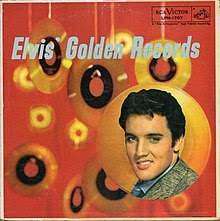
All Shook Up became one of his biggest hits. The song was written by Otis Blackwell and Elvis Presley and was released as a single in 1957. It spent eight weeks at the top of the Billboard Hot 100 chart, becoming Elvis's first number one hit in the United States.
The song features Elvis's signature rock 'n' roll style and catchy lyrics, making it an iconic track in his discography. "All Shook Up" is often associated with the excitement and frenzy surrounding Elvis Presley's early career, and it remains a classic and popular song to this day.
The track by Elvis Presley was not originally included on one of his studio albums. It was released as a standalone single in 1957. However, due to its popularity, the song was later included on several compilation albums and greatest hits collections.
The first Elvis Presley album that featured "All Shook Up" was the compilation album titled "Elvis' Golden Records," released in 1958. This album gathered many of his hit singles up to that point, and "All Shook Up" was among the standout tracks included.
Chords And Strumming
I play number with drop D tuning and a capo 2nd fret. The rhythm is a steady down up down up with some walking bass throughout with the chords D, G and a A but no required.
Guitar Lesson Details - (chords & lyrics sheet incl with lesson)
Chords & LyricsBack To Song List
Anyway You Want Me - Learn To Play On Guitar
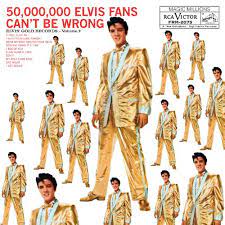
Anyway You Want Me (That's How I Will Be) was written by Aaron Schroeder and Cliff Owens and recorded by Elvis during his early career.
The track was released as a single on September 8, 1956. The single performed well on the charts, reaching No. 20 on the Billboard Hot 100 chart.
The song is a ballad that features Elvis' smooth and emotive vocal delivery. It showcases his ability to convey emotion through his singing.
Elvis recorded "Anyway You Want Me" on April 10, 1956, at RCA Studios in Nashville, Tennessee. The session was part of his prolific early recording career.
"Anyway You Want Me" is often associated with Elvis' early rock and roll style and his impact on popular music and can be found on several compilation albums of Elvis's early hit songs.
Chords And Strumming
I play this one in standard tuning with a down down down up down down and repeat pattern with the chords C, Am, F, G, C7, Ddim, D7 and a G7. There is no lead work in this number.
Guitar Lesson Details - (chords & lyrics sheet incl with lesson)
Chords & LyricsBack To Song List
Blue Moon Of Kentucky - Learn To Play On Guitar
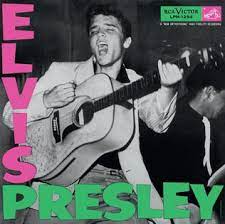
Blue Moon of Kentucky is a bluegrass song written by Bill Monroe. Presley's version was recorded in 1954 for his first single on the Sun Records label, which helped to launch his career.
Presley's version of "Blue Moon of Kentucky" features his distinctive vocal style, which combines elements of country, blues, and rock and roll. The song also features a prominent rhythm guitar, a driving bass line, and a lively beat that reflects the song's bluegrass roots.
One notable aspect of Presley's version of the song is the way he alters the melody and rhythm of the original, creating a unique interpretation of the song that still retains its essential character. The song became a hit for Presley and remains one of his most beloved recordings, and it has been covered by numerous other artists over the years.
The track was later included on his self-titled debut album, "Elvis Presley", which was released in 1956. The album also includes other classic Presley tracks such as "That's All Right", "Heartbreak Hotel", and "Hound Dog"
Chords And Strumming
This
old tune has a rockabilly vibe playing the A, D or D7 and the E chords.
You can also throw in the A7 and E7 chords where you see fit. If you
play the A chord up n the 5th fret you can use the B string a bit to
help with that rockabilly rhythm sound.
For rhythm I'm playing a root down up down up down up in a fast shuffle pattern and blending a few hammer-ons here and there.I've added in two separate lead sections but you can cut it back to just one if you want to.
Guitar Lesson Details - (chords & lyrics sheet incl with lesson)
Chords & LyricsBack To Song List
Blue Suede Shoes - Learn To Play On Guitar
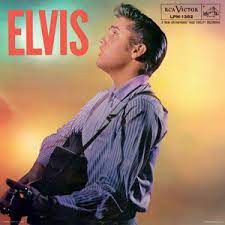
Blue Suede Shoes is a Carl Perkins number from 1955 and was recorded by Buddy Holly and Eddie Cochran. Elvis did his version for his debut album in 1956.
Elvis never had a #1 as Perkins did with his version. Elvis's version peaked at #20. Strangely enough Elvis almost had a #1 with this song on the US country charts, where it reached #2. Go figure! The song was also a #2 in The Netherlands and a top ten in Canada, Sweden, Australia and the UK.
The track appears on his debut studio album which was released on Mar 13th, 1956. The album was recorded in Nashville over a two day period in Jan of 1956.
Carl Perkins had recorded his version a few months earlier in Dec 1955 and recorded his version a few days after writing the song. He managed a #2 hit on the national chart and a #1 on the Memphis chart. It was recorded by Sam Phillips at Sun studio and he suggested the line go man go be changed to go cat go, which Perkins agreed to do. Later on Buddy Holly and Eddie Cochran did their versions but they never had a #1 hit either.
Chords And Strumming
This one I play with drop D tuning with a capo 2nd fret and a steady down up down up pattern with some walking thrown into the mix. Some lead required here with the chords G, C7, D and a D7.
Guitar Lesson Details - (chords & lyrics sheet incl with lesson)
Chords & LyricsBack To Song List
Devil In Disguise - Learn To Play On Guitar
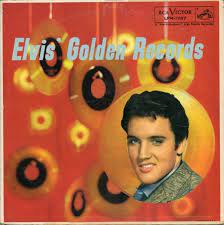
Devil in Disguise was recorded by Elvis Presley and became a successful hit for him. The song was written by Bill Giant, Bernie Baum, and Florence Kaye. It was released as a single in 1963 and later included on the album "Elvis' Gold Records Volume 4."
"(You're the) Devil in Disguise" showcases Elvis's versatile vocal style and features a catchy, upbeat melody. The song's theme revolves around a deceptive and alluring person, represented as the "devil in disguise."
Upon its release, the song performed well on the charts, reaching the top spot in the UK and peaking at number three on the Billboard Hot 100 chart in the United States. It remains a popular and well-regarded track in Elvis Presley's extensive discography.
For the rhythm in this song you'll need two different rhythm patterns. The first is a simple root down up root up down up and repeat pattern as the slower portion of the song. The when the pace picks up you'll need to switch to a root down up down up down up and repeat pattern.
Chords And Strumming
The chords here I'm going to play it in G, C, D and Em. The original key is in F which makes it easier to sing but a bit messy to play as you'd need flats and sharps to make this work. Plus is makes the little bit of picking in this song a bit awkward.
There is a bit of a break in here before the last verse but nothing too complicated.
Guitar Lesson Details - (chords & lyrics sheet incl with lesson)
Chords & LyricsBack To Song List
Don't Be Cruel - Learn To Play On Guitar
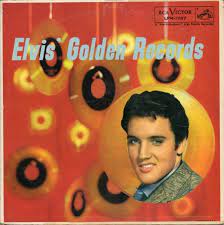
Don't Be Cruel is another one of Elvis Presley's most famous songs. He recorded it in New York City on July 2, 1956, and it was released as a single on July 13. The song quickly became a huge hit, reaching No. 1 on both the pop and R&B charts.
It's a fast-paced rock and roll song with a catchy beat, mixing R&B and country styles. Elvis sang it with lots of energy. The song was released with "Hound Dog" on the other side, which also became very popular.
"Don't Be Cruel" is seen as an important song in rock history. It helped make Elvis a star and shaped his image as an exciting performer. The song remains popular and is still considered one of Elvis's best
Chords And Strumming
With
this song I like to use a drop D tuning so I can incorporate some
walking bass into the rhythm using the four chords, D, G, Em and A. The
rhythm on this song is a down down up down up down up and repeat as you
play some of the walking bass notes, which I fully explain in the full
lesson tutorial.
There is no lead work in this song, just straight rhythm.
Chords & LyricsBack To Song List
Guitar Lesson Details - (chords & lyrics sheet incl with lesson)
Good Rockin Tonight - Learn To Play On Guitar
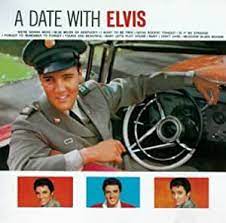
Good Rockin Tonight was written by Roy Brown in 1947. His version was a hit twice. In 1954, Elvis Presley made his own version.
Elvis recorded it at Sun Studio in Memphis and released it as his second single. The song mixes rhythm and blues with rockabilly, showing off Elvis's unique singing style. It's fast-paced and energetic.
While Elvis's version didn't make the charts, it helped make him famous and played a big part in making rock and roll popular in the 1950s. Many other singers have recorded this song, but Elvis's version is still one of the most important.
You can find it on Elvis's album "A Date With Elvis."
Chords And Strumming
Play this one with a root down up root up down up and repeat and then use a standard up and down rock and roll strum in standard tuning. The three chords are E, A7 and B7 and some lead required.
Guitar Lesson Details - (chords & lyrics sheet incl with lesson)
Chords & LyricsBack To Song List
Heartbreak Hotel - Learn To Play On Guitar
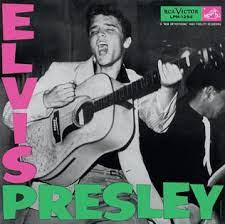
Heartbreak Hotel is a famous song that came out in 1956 and was a big hit, helping make Elvis a rock and roll star. The song was written by Mae Boren Axton, Tommy Durden, and Scotty Moore. They got the idea from a sad newspaper story about a lonely man.
The song mixes blues, country, and gospel music in a new way. Elvis's deep voice and the song's catchy guitar sound made it very popular. It became number one on different music charts, showing that many types of people liked Elvis's music.
"Heartbreak Hotel" was important in rock and roll history. It started Elvis's amazing career and is still loved by fans today.
I choose to play this song with a drop D tuning but that is always optional. Using the lower D gives a deeper bass sound to the song. This also changes the G chord structure to two top strings on the 5th. I'm playing mainly just down-strokes for the rhythm in the typical rock and roll kinda vibe.
Chords And Strumming
There
are only three chords here and they are D, G, A but you can throw in an
A7 and a D7 as you see fit as you move from the A and D chord
positions.
There is a bit of picking and some bass playing in this one but not too difficult.
Guitar Lesson Details - (chords & lyrics sheet incl with lesson)
Chords & LyricsBack To Song List
I Don't Care If The Sun Don't Shine - Learn To Play On Guitar
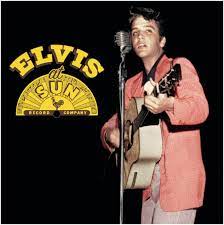
I Don't Care If The Sun Don't Shine was on the back of Elvis Presley's "Good Rockin Tonight" record in 1954. Mack David wrote it, and Dean Martin first sang it in 1950.
Elvis later made his own version, which is on his album "Elvis At Presley." It's a happy, energetic rock and roll song. Elvis sings about not caring if the sun doesn't shine as long as he's with his sweetheart.
The song shows off Elvis's lively singing and the early rockabilly sound, with guitars, drums, and piano. It captures the exciting feel of early rock and roll, which was a big part of Elvis's early music. This song reached number 74 on the US music chart
Chords And Strumming
Use a root down up down up down up rhythm pattern here in standard tuning and the three chords G, A7 and D7. Some lead work required in this number.
Guitar Lesson Details - (chords & lyrics sheet incl with lesson)
Chords & LyricsBack To Song List
I Forgot To Remember To Forget - Learn To Play On Guitar
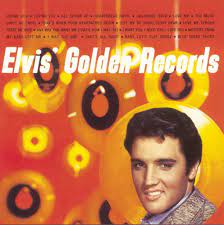
I Forgot to Remember to Forget came out as a single in 1955 when he was with Sun Records. It was on the same record as "Mystery Train," but on the other side. At first, it wasn't on any of Elvis's albums.
But after Elvis moved to RCA Victor in 1956, the song started showing up on collection albums. You can find it on "Elvis' Golden Records" from 1958, which has many of his hit songs. Over the years, lots of Elvis collection albums have come out.
These albums have different songs on them, so you might find "I Forgot to Remember to Forget" on some but not others.
Chords And Strumming
This on played in drop D tuning and a capo 2nd fret with the chords D, G, A and a D7. Some lead required here while playing a down up down up pattern with some walking bass.
Guitar Lesson Details - (chords & lyrics sheet incl with lesson)
Chords & LyricsBack To Song List
I Want You I Need You I Love You - Learn To Play On Guitar
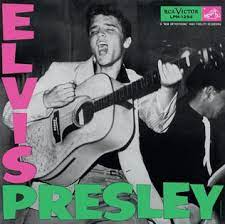
I Want You, I Need You, I Love You was released as a single in 1956 by RCA Victor. The song was written by Maurice Mysels and Ira Kosloff and became one of Elvis's early hits.
"I Want You, I Need You, I Love You" showcases Elvis's romantic crooning style and features a combination of rock and roll and ballad elements. The song's heartfelt lyrics and Elvis's passionate delivery resonated with audiences, contributing to its success.
The single reached number one on the Billboard Top 100 chart, becoming Elvis's second chart-topping hit after "Heartbreak Hotel." It solidified his position as a rising star and further established his popularity in the music industry.
"I Want You, I Need You, I Love You" was later included on Elvis's self-titled debut studio album, "Elvis Presley," which was released in 1956. The album featured a collection of his early hits, including this particular song.
Chords And Strumming
This one on the edge of my vocal range in C, Dm7, G7, G#, G, G7, Am, C7, F, Fm, D7, Cmaj7, Gm and an Fm with a down up down up down and repeat rhythm pattern in standard tuning. No lead work required in this one.
Guitar Lesson Details - (chords & lyrics sheet incl with lesson)
Chords & LyricsBack To Song List
I'm Left Your Right She's Gone - Learn To Play On Guitar
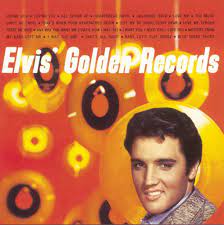
I'm Left, You're Right, She's Gone was released in 1955 when Elvis was with Sun Records. Stan Kesler and William Taylor wrote this upbeat rockabilly song.
It's about losing love, with Elvis singing about his partner leaving him. The song didn't become a big hit, but fans loved it.
It's now seen as one of Elvis's early classics. People remember it for its catchy guitar part and Elvis's lively singing. This song shows how Elvis helped create the rock and roll sound. You can find it on many Elvis collection albums.
Chords And Strumming
Played in E, A and B7 with some lead in standard tuning using a root down root up down up rhythm pattern.
Guitar Lesson Details - (chords & lyrics sheet incl with lesson)
Chords & LyricsBack To Song List
Lawdy Miss Clawdy - Learn To Play On Guitar
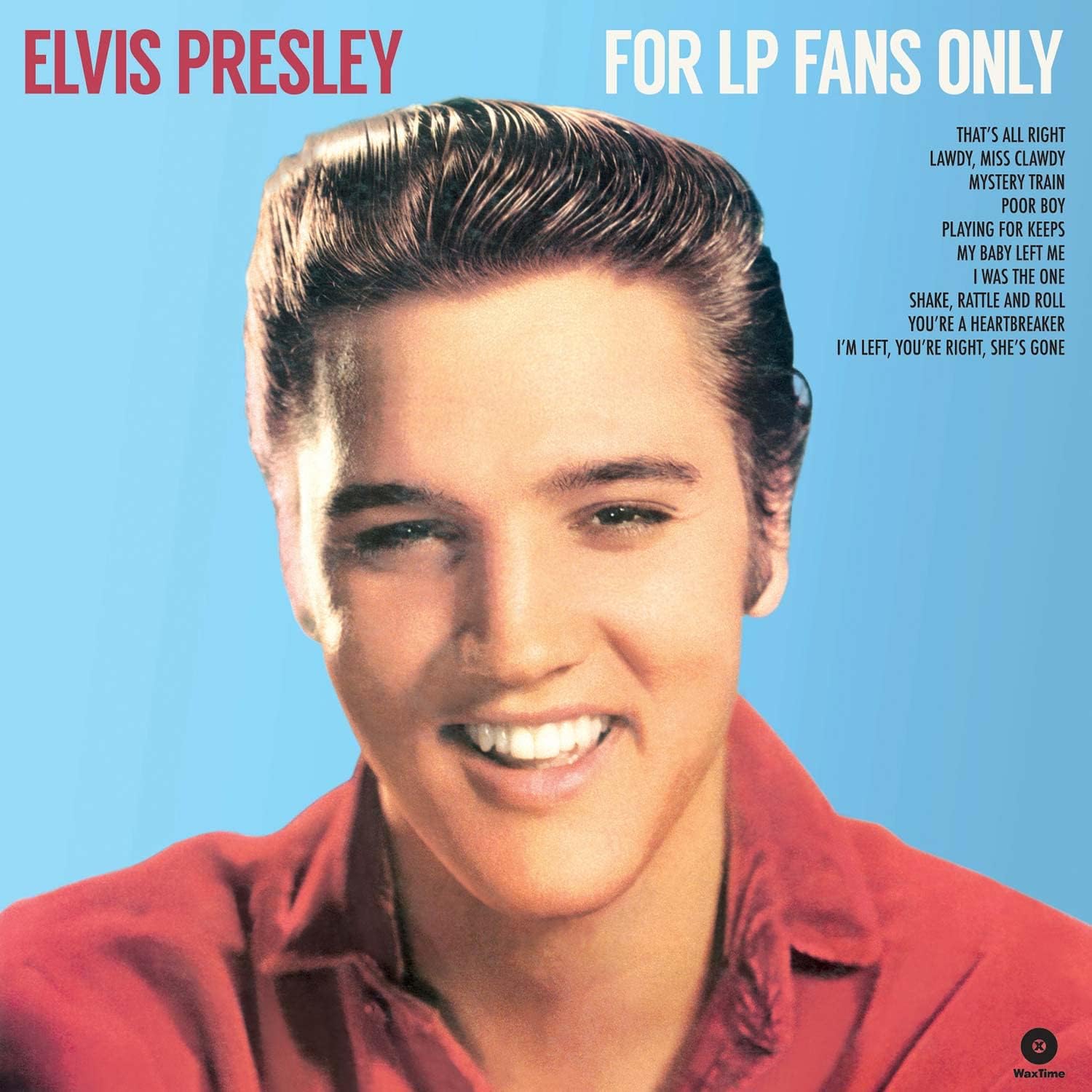
Lawdy Miss Clawdy was an R&B number released in 1952 and sold over a million copies. Elvis decided to cover the song in 1956 and it was released as a single from his 1956 Album For LP Fans Only, but his version didn't make the charts.
Chords And Strumming
I play this song one fret below pitch in this demo as I was asked to do so by a customer but it can be played in standard tuning using the chords E, A and B7. Some lead here with a steady root down up root up down up rhythm pattern.
Guitar Lesson Details - (chords & lyrics sheet incl with lesson)
Chords & LyricsBack To Song List
Memphis Tennessee - Learn To Play On Guitar
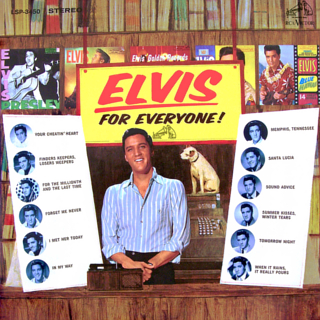
Memphis Tennessee is of course a song from Chuck Berry going back to 1959 when he had a #1 hit with the song. Elvis recorded his track for the album Elvis For Everyone, released in 1965. This track by Elvis was never released as a single.
Chords And Strumming
This one is played with down strokes with a muted rhythm using the chord G and D. A few riffs throughout this one in standard tuning.
Guitar Lesson Details - (chords & lyrics sheet incl with lesson)
Chords & Lyrics UnavailableBack To Song List
Money Honey - Learn To Play On Guitar
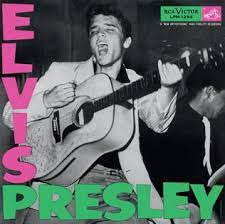
Money Honey was first recorded by blues artist Clyde McPhatter in 1953 with the newly formed group known as The Drifters. Elvis decided to recorded the song a few years later in 1956 for his debut album Elvis Presley. The song however was never released as a single.
Chords And Strumming
Play this one with an E, A and B7 with some lead required in standard using a root down up down up down up pattern. The rhythm here is a stop and go as you'll see.
Guitar Lesson Details - (chords & lyrics sheet incl with lesson)
Chords & LyricsBack To Song List
Mystery Train - Learn To Play On Guitar
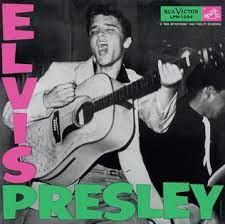
Mystery Train is a famous song on Elvis Presley's first album. Junior Parker and Sam Phillips wrote it, and Elvis released it as a single in 1955.
The song didn't make it onto the charts, but it became very important for rockabilly and rock 'n' roll music. The lyrics are sad and use a train as a symbol for life's journey.
There's no music video for the song because it came out before those were common. When playing "Mystery Train," guitarists use a special rockabilly style on the E and A chords. This involves quickly moving between notes and strumming in a specific pattern to create the right sound.
Chords And Strumming
There are only three/four chords in this song and they are E, A, A7 and B7. The break in this song is just the chord pattern already discussed with perhaps a bit more emphasis on the rhythm hand by chopping up the rhythm a bit.
Guitar Lesson Details - (chords & lyrics sheet incl with lesson)
Chords & LyricsBack To Song List
One Night With You - Learn To Play On Guitar
Chords And Strumming
This one I play in standard tuning with a root up down up root up down up rhythm pattern with some riffs and down strokes. No picking required with the chords E, A, B7, E7 and a Gb.
Guitar Lesson Details - (chords & lyrics sheet incl with lesson)
Chords & LyricsBack To Song List
Paralyzed - Learn To Play On Guitar
Chords And Strumming
For rhythm here play a down up down up down up with some walking bass in standard tuning. No lead work here with the chords A, D, D7, G and E.
Guitar Lesson Details - (chords & lyrics sheet incl with lesson)
Chords & LyricsBack To Song List
So Glad You're Mine - Learn To Play On Guitar
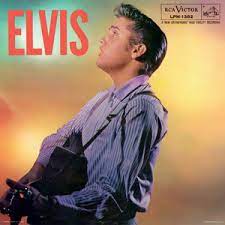
So Glad You're Mine hails from Elvis's 2nd album released in 1956 called simply Elvis.
This song was never a single release.
Chords And Strumming
This one is played higher in E but I play it in a drop D tuning with D7, G and an A. The rhythm is a simple down up down up with a bit of bass note playing and some lead work.
Guitar Lesson Details - (chords & lyrics sheet incl with lesson)
Chords & LyricsBack To Song List
Such A Night - Learn To Play On Guitar
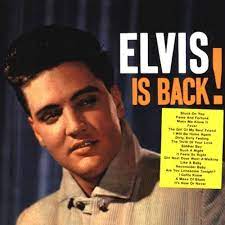
Such a Night was originally written and recorded by R&B artist Roy Brown in 1953, but Elvis covered the song and released his version in 1960. Elvis's rendition of "Such a Night" was featured on his album titled "Elvis Is Back!" which was released in the same year.
Elvis's version of "Such a Night" showcased his unique vocal style and blended elements of rock and roll, rhythm and blues, and rockabilly. It remains a popular and well-known song in Elvis's repertoire.
Chords And Strumming
This one you can play in standard tuning with the chords D, A, D7 and G with no lead. The rhythm pattern is a steady down up down up pretty much all the way through.
Guitar Lesson Details - (chords & lyrics sheet incl with lesson)
Chords & LyricsBack To Song List
Teddy Bear - Learn To Play On Guitar
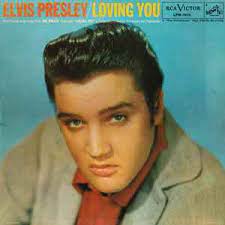
Teddy Bear is a popular Elvis Presley song from 1957. It was written by Kal Mann and Bernie Lowe. The song is a fun mix of rock and roll and doo-wop, with a catchy tune.
In the song, Elvis sings about wanting to be his girlfriend's "teddy bear" and protect her. It shows off Elvis's smooth voice and upbeat style.
"Teddy Bear" was a big hit. It reached #1 on the US charts and was popular in other countries too. This was Elvis's seventh #1 hit in the US, helping make him a big rock and roll star.
The song was also part of Elvis's album "Loving You," which came out the same year.
Chords And Strumming
I use drop D tuning here but no lead work required as you move through the chords G, Gb, F, C, C7 and C. For rhythm you'll need a down up stop up down up stop up with a fast shuffle and some walking bass.
Guitar Lesson Details - (chords & lyrics sheet incl with lesson)
Chords & LyricsBack To Song List
That's Alright Mama - Learn To Play On Guitar
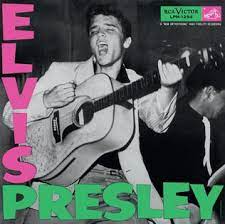
That's All Right Mama was the first commercial single by Elvis and is considered one of his breakthrough songs. The song was originally written and recorded by blues musician Arthur "Big Boy" Crudup in 1946.
Elvis's version of the song was recorded at Sun Studio in Memphis, Tennessee, on July 5, 1954. It combined elements of blues, country, and rockabilly, creating a new and exciting sound that would become a cornerstone of rock and roll.
The single was released on July 19, 1954, and received positive reviews, helping to establish Elvis as a rising star in the music industry.
Chords And Strumming
This one is in A, A7, D7 and an E7 with a root down up down up down up and repeat rhythm pattern in standard tuning and some lead work required.
Guitar Lesson Details - (chords & lyrics sheet incl with lesson)
Chords & LyricsBack To Song List
Treat Me Nice - Learn To Play On Guitar
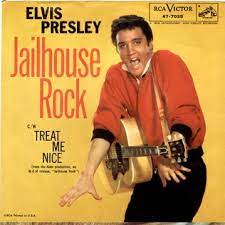
Treat Me Nice was a B-side song to the A-side single Jailhouse Rock which was release back in 1957.
The song also appeared in the Jailhouse Rock film.
Chords And Strumming
This one I play in standard tuning with the chords G, C, C7, F, D7, G7, Adim, C#7 but there is no lead work in this song. For rhythm I play a down up stop up down up stop up and repeat pattern.
Guitar Lesson Details - (chords & lyrics sheet incl with lesson)
Chords & LyricsBack To Song List
Trying To Get To You - Learn To Play On Guitar
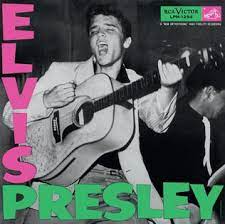
Trying To Get To You is an early Elvis song that can be found on the album "Elvis Presley" (also known as Elvis Presley's debut album or Elvis Presley Rock n' Roll No. 1). It was written by Rose Marie McCoy and Charles Singleton.
"Trying To Get To You" was released as a single in 1956. It reached number 33 on the Billboard Pop Singles chart and number 6 on the Billboard Country Singles chart.
The track is an emotional and soulful song about the struggles and determination of trying to reach a loved one. It portrays a sense of urgency and longing for connection, reflecting the narrator's relentless efforts to be with the person they desire.
No official music video was produced for "Trying To Get To You" due to its release predating the era of music videos.
Chords And Strumming
This one played with an E, A and B7 in standard tuning using a root down up root up down up rhythm pattern. No lead but a few riffs throughout.
Guitar Lesson Details - (chords & lyrics sheet incl with lesson)
Chords & LyricsBack To Song List
When My Blue Moon Turns To Gold Again - Learn To Play On Guitar
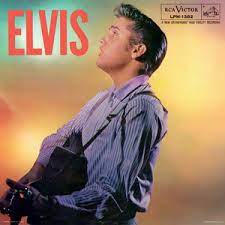
When My Blue Moon Turns To Gold Again was written in 1940 and first recorded in 1941 by the writers Wiley Walker and Gene Sullivan.
Elvis recorded the song years later in 1956 for his album Elvis. The song was never released as a single.
Chords And Strumming
I play this one in standard tuning using the chords E, A and B7 with a root down up down up and repeat rhythm patter, Some lead work required.
Guitar Lesson Details - (chords & lyrics sheet incl with lesson)
Chords & LyricsBack To Song List
You're A Heartbreaker - Learn To Play On Guitar
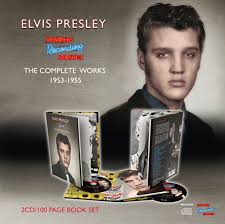
You're A Heartbreaker was recorded in Dec of 1954 and became the B-side to the song Milkcow Blues Boogie. The track can be found on the album Elvis Presley The Complete Works 1953 - 1955.
Chords And Strumming
You'll need a D, D7, G, A and A7 chords for this one in standard tuning. Use a root down up down up down up and repeat rhythm pattern but no lead required, just a few riffs during the rhythm phase.
Guitar Lesson Details - (chords & lyrics sheet incl with lesson)
Chords & LyricsBack To Song List
Each of these Elvis songs captures a different side of his early legacy — upbeat rockers, heartfelt ballads, and genre-defining classics. With these easy-to-follow acoustic tutorials, you'll not only learn the chords and rhythms but also get a feel for the swagger and soul that made Elvis a legend.
Dive into this 1950s set, and when you’re ready for more, be sure to explore our additional Elvis volumes covering his 60s movie tracks, 70s gems, and unforgettable love songs.
If you liked this Elvis songs in the 50s page you might also like ... (click images)
Top Hits Of The 50s
